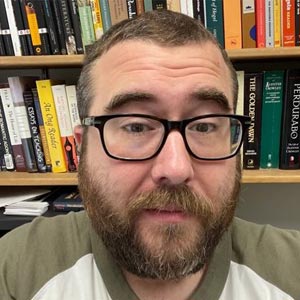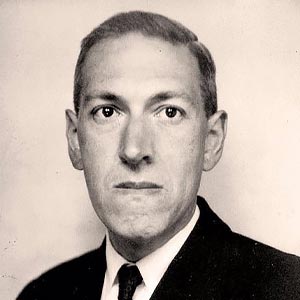A study in horror
/prod01/twu-cdn-pxl/media/images/esfl/cthulhu.jpg)
PhD candidate Cerliano explores the weird

October 30, 2023 – DENTON ― How does one fathom the works of H.P. Lovecraft?
Even if you haven't read his stories, you've probably heard his name. He was impoverished and little known in his lifetime but grew fame and an out-sized influence over the last century. Derided by a contemporary critic as "The only real horror in most of these fictions is the horror of bad art and bad taste," yet feted as creator of a mythology that spawned a century of short stories, novels, movies, television shows and video games.
Lovecraft's weird and horror fiction has triggered nightmares, stimulated imagination, sparked reflection on the human condition, and inspired the careers of authors Stephen King and Neil Gaiman, movie directors John Carpenter, Sam Raimi, Roger Corman and Guillermo del Toro, video game director Hidetaka Miyazaki and artist H.R. Giger.
He is also fueling Michael Cerliano's pursuit of an academic career.
"There was a bookstore in Dallas called Shakespeare, Beethoven & Co. in the Galleria," said Cerliano, a doctoral student in rhetoric at Texas Woman’s University. "I used to go there as a kid, and I saw a copy of The Call of Cthulhu and Other Stories in the Penguin Classic section. I had heard Lovecraft's name but didn't really know anything about him. I bought the book, read it and that was it for me."
Cerliano, who is also the English department's undergraduate advisor, focuses his work on the intersection of rhetoric, esotericism, and culture. He wrote "Witchcraft and the Enlightenment in the Blood on Satan’s Claw," about Piers Haggard’s 1971 film, and a chapter on Lovecraft, hauntology, and apocalypticism for Lovecraft in the 21st Century: Dead, but Still Dreaming."
"That was published just as I was starting the program here at TWU," he said. "I'm very proud of it."
Cerliano's academic journey, which began by earning bachelor's and master's degrees at UT Tyler, is influenced by Eugene Thacker, who wrote three volumes of philosophy criticism that make up his Horror of Philosophy, which, according to its publisher, suggests the horror genre offers "a way of thinking about the unthinkable world. To confront this idea is to confront the limit of our ability to understand the world in which we live – a central motif of the horror genre."
"That was a really important work for me in terms of shaping my research interest and kind of helping me articulate what I wanted to do as a scholar," Cerliano said. "A lot of my work engages with the weird, the eerie things that are outside of traditional, things that reshape traditional worldviews, because I think when we encounter something like Lovecraft, we are invited to rethink our place in the universe, our relationship to the world, the horizon of possibility gets shifted in a lot of ways. In all of Lovecraft's stories, someone uncovers knowledge that's been hidden, that's been repressed, that then usually drives them insane. But really, what's happening is that it's reshaping how they see themselves in the world around them. I think that something similar happens to people who read Lovecraft, and that's something that I've always been intrigued by."
Howard Phillips Lovecraft was little regarded in his time and died in poverty at age 46 in 1937. His stories in pulp magazines found a small but devoted audience who wrote their own stories built within the Lovecraft universe, with his permission and encouragement. By the 1970s, Lovecraft underwent a scholarly revival, ultimately regarded as a significant author of supernatural horror who spawned the literary philosophy known as cosmicism.
Lovecraft's writing skills have long been debated, but he was among the early builders of worlds with their own rules, a tactic so profitably employed by King, Gaiman, J.K. Rowling, George R.R. Martin and the recent deluge of dragon-filled tomes.
Lovecraft's view was much darker. The fundamentals of cosmicism is there is no divine presence, humans are insignificant and there are ancient deities, creatures beyond human comprehension known as the Great Old Ones. They came to Earth long before the time of man but were defeated and banished by the Elder Gods, and now exist outside of normal time and space but still exert influence. They are not rampaging kaiju like Godzilla, but work more insidiously at the edge of reality, destroying spirit and sanity rather than stomping cities.
It is these supernatural characters who ultimately captured the public fascination. And it was one of these beings whose name is most commonly associated with Lovecraft's universe: the Cthulhu Mythos.
A mythos begins

In 1920, Lovecraft began publishing the stories that would form his mythology. In 1921 came "The Nameless City," which introduced Abdul Alhazred, author of the Necronomicon, a book of magic. In 1928, Weird Tales published "The Call of Cthulhu," which introduced the cosmic entity Cthulhu (pronounced Khlûl′-hloo or kuh-THOO-loo), described by Lovecraft as "A monster of vaguely anthropoid outline, but with an octopus-like head whose face was a mass of feelers, a scaly, rubbery-looking body, prodigious claws on hind and fore feet, and long, narrow wings behind."
One website lists 187 Great Old Ones, like Cthulhu's half-brother, Hastur the Unspeakable. Then there are the Outer Gods and the Elder Gods. Some were created by Lovecraft, many others by those who followed his literary footsteps. Names like Azathoth and Yog Sothoth look like someone spilled a pile of Scrabble tiles, but Cthulhu is so ingrained in society that Microsoft Word's spellchecker doesn't flag it.
"Lovecraft had such a huge impact on the culture, head and shoulders above his contemporaries," Cerliano said. "Foucault (French philosopher, historian, writer, political activist and literary critic Paul-Michel Foucault) talks about authors who become discourses unto themselves. They produce texts, but then there are plenty of texts written about them. They become a source of inspiration to other later thinkers who are always urging us to go back and look at this. Foucalt talks about Freud and Marx and Hegel, but Lovecraft has done that as well because he's been picked up by philosophers, by people in literary theory and rhetoric.
"In the chapter I wrote, I talked about how he provides us with a rhetorical framework for thinking about basically the end of the world. I wrote it just as the COVID-19 pandemic was starting. And so between the fears of climate catastrophe, fears of everything else happening, it's interesting to me that he has become such a huge part of the culture with that as the background. I think that he's become a part of the wider culture in that sense, even though people may not know who he was or anything about his life or his work."
Lovecraft has influenced all manner of popular culture, even when not drawn directly on his stories. Movies such as Cast a Deadly Spell, Event Horizon, In the Mouth of Madness, John Carpenter's The Thing, the novel and film Annihilation, the TV series Lovecraft Country, and video games such as Stygian, Eldritch, The Secret World, Gray Dawn and Bloodborne have Lovecraft inspirations. The Necronomicon appears in countless works, including comic horror films such as Evil Dead and Army of Darkness.
"Lovecraft lends himself to different genres beyond simply being locked into, oh, well, it's horror," Cerliano said. "It's because of the questions he raises, the issues that he explores. There have been weird westerns, there have been all kinds of things written making use of the Lovecraft mythos. I think that the flexibility of his fiction is one of its strengths and one of the things that has led to its enduring appeal."
Which extends beyond entertainment.
"He's had that impact on philosophy, on religious studies," Cerliano said. "A lot of new religious movements have made use of the Necronomicon idea or just Lovecraft's fiction generally. All of these movements drew on elements they knew were fictional but that still had spiritual interest to them and they were able to build systems or practices around that. It's this infinite variety of reactions to Lovecraft that I think shows that there really is something there in his work that's worth exploring."
Which is what Cerliano does in his research.
"I was interested in the way ideas shape ourselves and the way we communicate with each other," he said. "Rhetoric is not just about persuasion argumentation. One of the key ideas in modern rhetoric is identification, from Kenneth Burke (literary theorist and writer on philosophy and rhetorical theory). I find it interesting when we watch a horror film or read a horror story, we're seeing things that are beyond normal experience. But there are those moments of identification with a character or an incident, and that's where the effect begins to happen, that reshaping of what's possible or of who we are or of what our relationship is to the world. The tension between those, I think, is where very interesting thinking can happen and where interesting growth can happen."
Cerliano gets to combine his interest in horror and rhetoric as part of his scholarship.
"I'm very lucky," he said. "I'm very lucky to be here as well. No matter how odd my work has gotten, I found that my committee has always been encouraging to me and supportive of my research interests. I'm really glad I'm in a place where they say yes to things like this, even if it is maybe outside of what is traditionally considered rhetorical studies, because really it's all about inventing and communicating ideas and I think that's kind of the key to it."
And, perhaps one day, maybe teach a course on weird literature?
"I would really like to," he said. "I was talking with my advisor (Gretchen Busl, PhD) the other day and she said when I get to the post-comps writing the dissertation stage, that I should maybe consider asking for that, just seeing what's available, what could be taught, because grad students at that level do have that opportunity. I would love to teach a class, maybe the history of weird literature or about women and weird literature. There have been several anthologies that have come out of classic short stories by Women Writing for Weird Tales and other similar magazines. I think that would be really fun to teach, if students are game for it."
There is one other question that the case of H.P. Lovecraft raises. Though he made little money from his work, his legacy has grown and his writing continues to inspire. On the other hand, any number of writers profited during their lives, but their stories were quickly forgotten and their renown did not survive them.
So, fleeting fortune or lasting legacy. Which would you prefer?
Read Michael Cerliano's "Witchcraft and the Enlightenment in the Blood On Satan’s Claw."
Media Contact
David Pyke
Digital Content Manager
940-898-3668
dpyke@twu.edu
Page last updated 2:52 PM, December 1, 2023